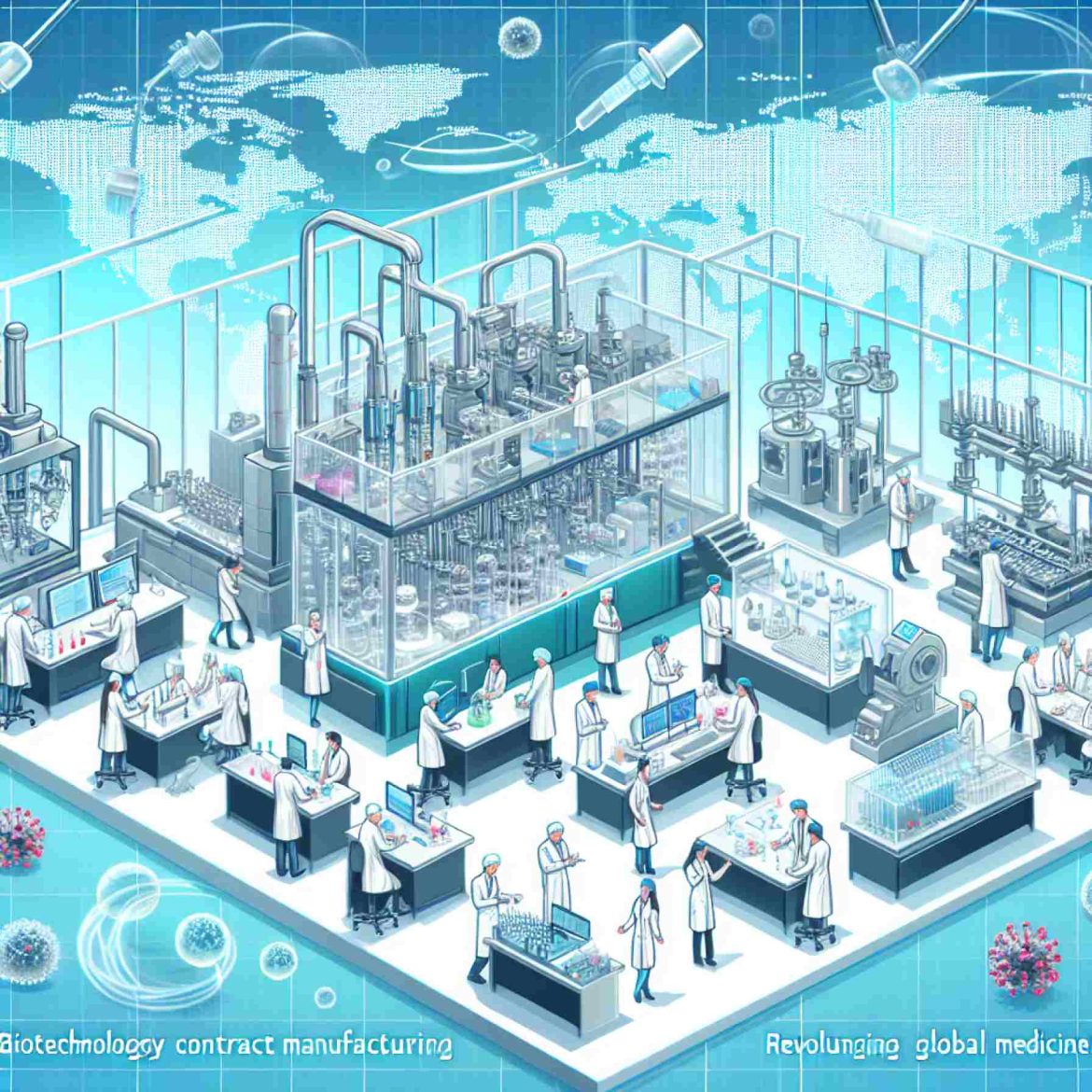- Biotechnology contract manufacturing is rapidly transforming, driven by innovations in life-saving therapeutics.
- CMOs enable pharmaceutical companies to focus on R&D by handling the manufacturing of complex biopharmaceuticals like vaccines and gene therapies.
- The market was valued at $16.28 billion in 2023 and is projected to reach $31.05 billion by 2031, fueled by increased R&D investments and demand for generics.
- Despite challenges like complex production and consumer skepticism, strict compliance and safety standards are enhancing trust in contract manufacturing.
- Asia Pacific is leading the sector’s growth, with strong government support for healthcare innovation and increased outsourcing in countries like China and India.
- Key players like Lonza and Samsung Biologics are expanding capabilities through strategic alliances to boost capacity and reduce timelines.
- Biotechnology contract manufacturing is essential for turning scientific visions into reality, promising to revolutionize future healthcare.
The realm of biotechnology contract manufacturing is witnessing a transformation akin to a thrilling scientific revolution, where beakers bubble over with life-saving cures and innovation knows no bounds. As this industry blooms, it offers a poignant glimpse into the future of medicine—one that promises advancements designed to save countless lives.
Biotechnology contract manufacturing, an integral cog in the wheel of modern life sciences, allows pharmaceutical giants to hand over the baton of production to specialized third-party organizations known as Contract Manufacturing Organizations (CMOs). By doing so, pharmaceutical and biotechnological companies can sharpen their focus on pioneering research and development while ensuring the efficient and swift rollout of groundbreaking products. With these partnerships, CMOs wield advanced technologies to manufacture complex biopharmaceuticals, ranging from vaccines and gene therapies to monoclonal antibodies and therapeutic proteins.
At the heart of this market surge, valued at nearly $16.28 billion in 2023 and projected to skyrocket to $31.05 billion by 2031, is an insistent hunger for innovation. The driving forces include rising investments in R&D, a burgeoning demand for generic pharmaceuticals, and an increasing reliance on advanced manufacturing technology. These factors propel the biotechnology contract manufacturing sector into an era characterized by unprecedented agility and flexibility.
The market isn’t without its challenges. The production of biopharmaceuticals comes with unique complexities, from meticulous packaging and labeling to rigorous sterilization processes. Moreover, some consumers remain skeptical about the outsourcing of drug production, placing trust in traditional, in-house manufacturing. Yet, as public understanding deepens and trust is built through stringent compliance and proven safety standards, these barriers are expected to crumble.
Asia Pacific stands at the forefront of this rapid evolution. The region teems with opportunities, fueled by government initiatives pushing healthcare innovation, robust investments in pharmaceutical R&D, and a palpable shift toward outsourcing. Countries like China and India are reinforcing their manufacturing prowess, further catapulting the biotechnology contract manufacturing market into a brighter spotlight.
Globally, leading industry players such as Lonza, Samsung Biologics, and Thermo Fisher Scientific are setting benchmarks for excellence, continually expanding their capabilities and geographical reach. Strategic alliances, like the partnership between GSK and WuXi Biologics, underscore the symbiotic relationships upping the ante in this competitive field—boosting production capacity and accelerating timelines for processes that might take years longer without such cooperation.
As the world looks ahead, biotechnology contract manufacturing remains a crucible for innovation that holds the promise of curing diseases that once seemed invincible. It is here, in state-of-the-art facilities across the globe, that the alchemy of science turns vision into reality—an industry not just manufacturing products but crafting the future of healing itself.
The Future of Medicine: How Biotechnology Contract Manufacturing is Revolutionizing Healthcare
Understanding Biotechnology Contract Manufacturing
Biotechnology contract manufacturing represents a crucial facet of the modern life sciences sector, allowing pharmaceutical companies to outsource production to specialized Contract Manufacturing Organizations (CMOs). This strategic move enables pharmaceutical giants to concentrate on cutting-edge research and development while CMOs handle the production of complex biologics like vaccines, gene therapies, monoclonal antibodies, and therapeutic proteins.
How Biotechnology Contract Manufacturing Works
Understanding the process behind biotechnology contract manufacturing can be insightful:
1. Selection of CMO: Pharmaceutical companies choose a CMO based on expertise, capacity, and quality standards.
2. Process Development: Both parties collaborate to develop a manufacturing process that meets regulatory requirements.
3. Scale-Up Production: CMOs use their advanced technologies to scale up the production process efficiently.
4. Quality Control: Rigorous testing ensures that the products meet the necessary safety and efficacy standards.
5. Packaging & Distribution: The final products are prepared for market launch with appropriate packaging, labeling, and logistics management.
Market Trends and Forecasts
The biotechnology contract manufacturing market, valued at $16.28 billion in 2023, is anticipated to hit $31.05 billion by 2031. Several trends fuel this growth:
– Increased R&D Investments: Companies are investing heavily in research and development, driving demand for efficient manufacturing solutions.
– Surge in Generic Drugs: A growing need for cost-effective generic biologics is paving the way for CMOs to expand their services.
– Advanced Manufacturing Technologies: Innovations like single-use technologies and continuous manufacturing are enhancing production efficiency.
Real-World Use Cases
Examples of effective biotechnology contract manufacturing collaborations include:
– Lonza and Moderna: Lonza plays a pivotal role in manufacturing Moderna’s COVID-19 vaccine, showcasing the ability of CMOs to meet unprecedented global demands.
– WuXi Biologics and GSK: Their partnership exemplifies how joint ventures can increase production capabilities and reduce time-to-market for critical therapies.
Industry Challenges and Controversies
Biotechnology contract manufacturing, while promising, faces several hurdles:
– Quality Assurance: Ensuring consistent quality across batches is a critical concern.
– Regulatory Compliance: Meeting stringent global regulations can be challenging, especially with evolving standards.
– Outsourcing Skepticism: Some stakeholders remain wary about the outsourcing of pharmaceutical manufacturing, concerned about potential risks to product quality.
Noteworthy Market Players
Prominent CMOs include:
– Lonza: Known for its comprehensive biopharmaceutical production services.
– Samsung Biologics: A leader in scalable biologics manufacturing solutions.
– Thermo Fisher Scientific: Offers integrated solutions across the biologics production spectrum.
Actionable Recommendations for Stakeholders
1. Due Diligence: Companies should rigorously evaluate potential CMOs based on track records and compliance standards.
2. Collaboration and Transparency: Developing strong partnerships with clear communication channels is vital for successful outsourcing.
3. Leverage Technology: Adopting cutting-edge technologies can enhance efficiency and reduce costs.
The Future Outlook
The ongoing evolution of biotechnology contract manufacturing promises to transform the healthcare landscape, making it possible to address many previously untreatable diseases effectively. As technology progresses and trust in outsourcing grows, the potential for breakthroughs in life-saving therapeutics is immense.
For more insights into biotechnology advancements, visit Lonza or Thermo Fisher Scientific.
Quick Tips for BioTech Companies
– Engagement with CMOs early: Start partnerships early in the development process for better alignment and smoother transitions.
– Focus on Quality: Consistent monitoring and quality checks are crucial to maintaining product integrity.
– Stay Updated: Keep abreast of regulatory changes and technological advancements to stay competitive.
By strategically leveraging the capabilities of CMOs, pharmaceutical companies can expedite the development of innovative therapies, offering hope to millions worldwide.



